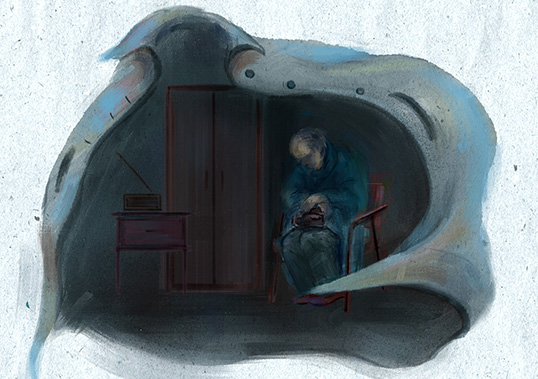As this year draws to a close, Asymptote invites you to look back at the most-read articles of the year. These are the ten pieces that resonated most with our far-flung readership, the texts you read, shared and returned to in the greatest numbers. 2022 was a year of sudden jolts, strange twists and great upheaval—qualities that each of these pieces speak to in their own ways. Superb translations and insightful interviews await!
Kicking off the list is Thomas Bernhard’s “The Loden Cape” excerpted and translated from the German by Charlie N. Zaharoff. In it, an old man tells his lawyer of a plot to defraud him of his business. The conspirators? His own son and daughter-in-law, who have taken over the running of the business and have forced him to move into the rooms above the shop floor, where he cannot interfere with their plans. The conspiracy is murky and the details emerge with difficulty, not least because Humer is a haphazard raconteur. Isolation and grievance have left him erratic, prone to wandering digressions and sudden bursts of invective. Humer’s words have been recorded with near stenographic fidelity by his lawyer, Herr Enderer—whose private, scathing impressions have themselves been inserted into the story by our unnamed narrator. A delightfully torturous mise en abime results, with Humer’s rants and Enderer’s marginalia crammed together into a mess of perspectives and voices. Sentences like the following are typical:
“Suddenly, says Humer, writes Enderer, I said: no, not onto the third floor, not onto the third. That’s final! Not into those inhuman quarters! I said, Humer says, writes Enderer, not into that dismal crawlspace.”
The bile fairly sloshes; this is all vintage Bernhard. In his translator’s note, Charlie H. Zaharoff mentions the author’s fondness of the “nested sentence”—a pretty term that draws attention to the intricate structural joists that keep the chaos in its frames. That it all fits together is a testament to the quality of Zaharoff’s translation and it’s a pleasure to unpick the strands. Unsurprisingly, the text was a favorite among Asymptote staff as well, making a series of best-of lists for our Summer issue. Our copy-editors took particular pleasure in its knottiness. Says Liam Sprod:
“[…] his nested sentences spiral out into evermore convoluted logics and precise obsessions, until the clauses build and build to an almost unsustainable mass. It is equally alienating and difficult, but that is where there is the perversity of enjoyment.” READ MORE…



